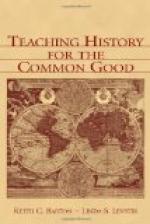If the student in American history is asked to go to the board at intervals and write an outline for the work covered on such topics as the following, he will come much nearer understanding the progress of our people:—
1. History of the tariff.
2. Political parties and principles for which they stood.
3. Things that crystallized Northern sentiment against slavery.
4. Reasons for the unification of the South.
5. Diplomatic relations of the United States.
6. Additions of territory.
7. Financial legislation.
8. Growth of humanitarian spirit.
There will easily be sufficient topics so that each member of the class will have a different one. They can all work at the board, simultaneously. The amount of time used for exercises of this sort need not be great, and the value received is incalculable.
If the teacher wishes to review briefly on the military, diplomatic, social, political, or economic history of the people the class have been studying, it is no difficult matter to arrange a set of questions, the occasional review in which will clinch in the student’s mind what otherwise would surely be forgotten. Such questions as the following on the financial history of the United States are each answerable with a few words and will serve as an illustration of the method which may be employed in reviewing any other phase of history:—
1. By what means was trade accomplished before the use of money?
2. What are the functions of money?
3. What determines the amount of money needed in a country?
4. What has been used for money at various periods of our history?
5. What is meant by doing business on credit?
6. What is cheap money?
7. What is Gresham’s Law?
8. What is the effect of large issues of paper money on prices?
9. What is the effect of large issues of paper money on wages?
10. Why does the wage-earner suffer?
11. At what periods in
American history have large issues of paper
money
been emitted?
12. What were the objects of the first United States Bank?
13. Did the bank accomplish them?
14. Why was it not rechartered?
15. When was the second United States Bank chartered?
16. Why?
17. What case decided the constitutionality of the bank?
18. Did the second United
States Bank accomplish the purpose for
which
it was formed?
19. Why was the second United States Bank rechartered?
20. What is meant by “Wildcat Banking”?
21. What are the dates of our greatest panics?
22. What were the chief causes?




